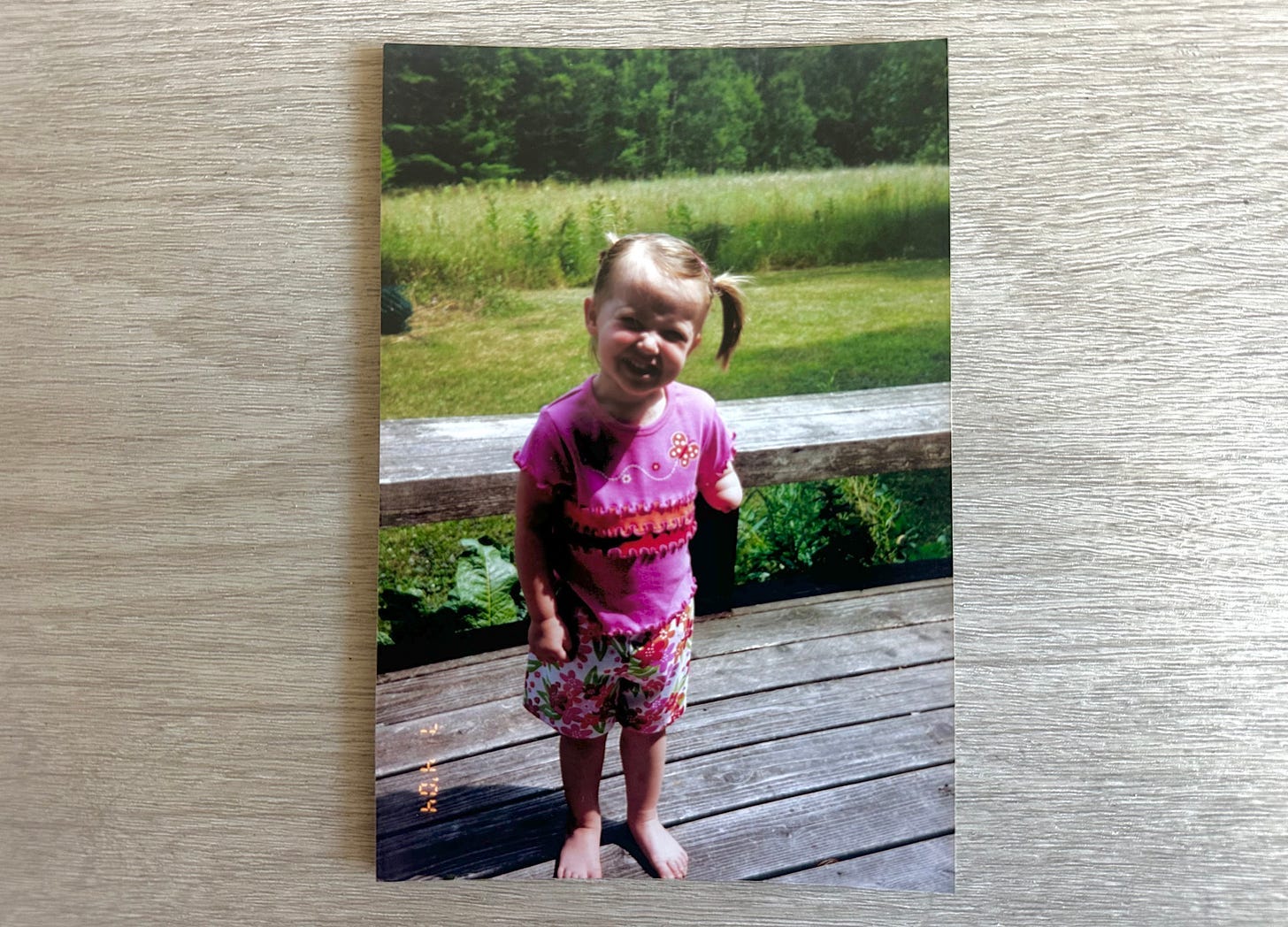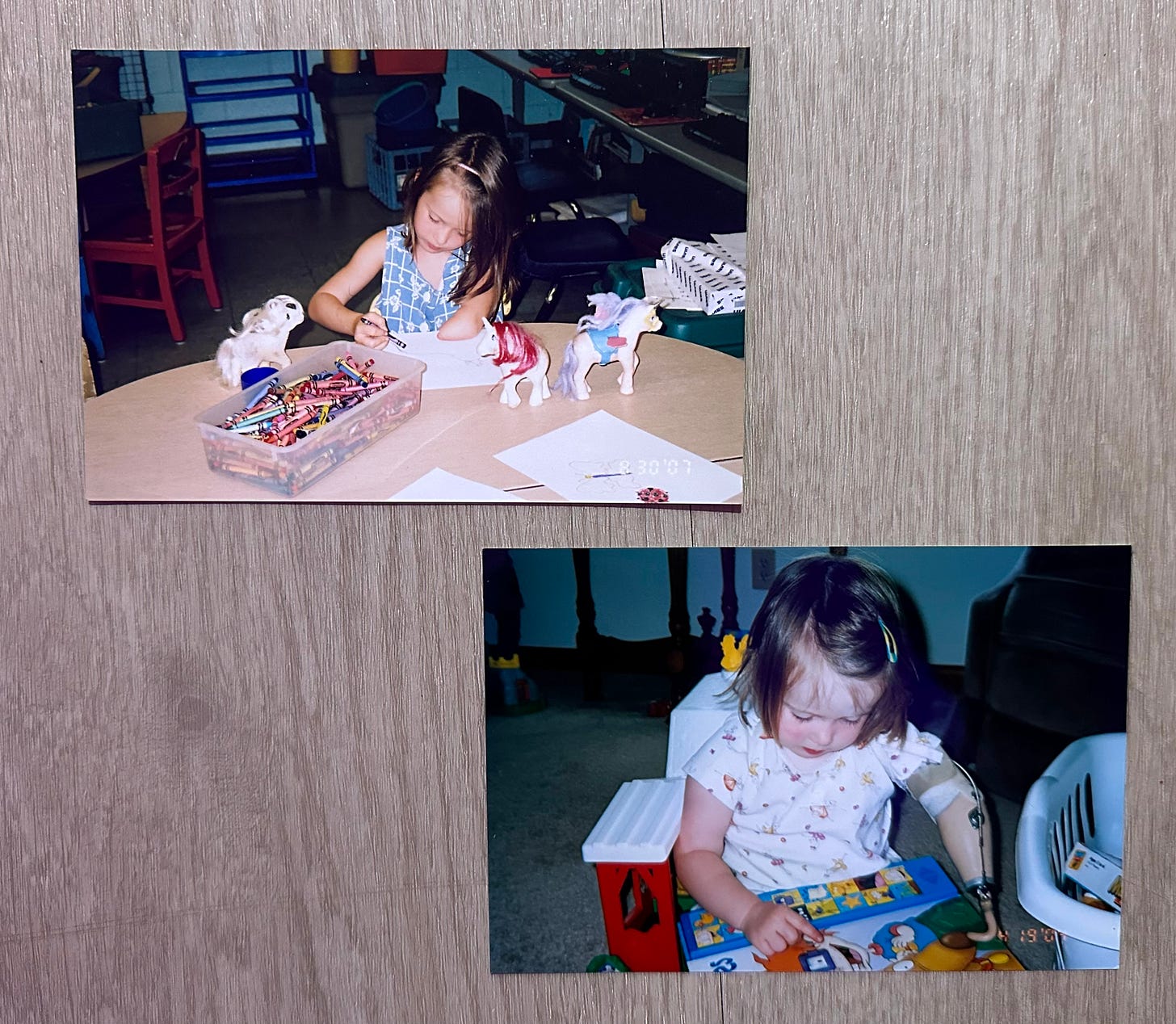Hello friends…
It's been a minute. Or 126 days, if you’re a person who counts.
I took some time away from writing, and now I'm back just in time for Limb Loss & Limb Difference Awareness Month in April. Purely coincidental timing, but exploring disability was one of the central motivators behind this writing practice — so here we are, again.
This was sparked by something that happened at the airport last month. I saw a girl, maybe twelve or thirteen, standing at my gate. Before I even consciously registered what I was seeing, I knew. The way she held her arm close to her side, so still, no swinging. The slight curve of her shoulder inward. The way she took up just a little less space than she probably should.
I wanted to hug her. I wanted to shake some sense into her. Into me at that age.
I've been asked many times: What would you tell someone younger than you with a limb difference? And I've usually fumbled my way through some answer that sounds good but doesn't actually help anyone —and which certainly wouldn't have helped my stubborn 12-year-old self. So I’ve finally decided to attempt to write the real thing.
This letter was supposed to be succinct but once I got started I realized—GODDAMN—there was a lot younger me needed to hear (still needs to hear!). So if this turns into a part 1, 2, and maybe even 3, consider yourself warned.
A Letter to My Younger Self
Part 1: On Shame & Hiding
Dear 12-year-old you,
Do you remember that little girl version of yourself? That squinty-smiley one pictured above? She who twirled every shopping bag in the crook of her little arm. And stomped in every puddle of the parking lot. She who insisted on dressing herself every morning, only to emerge from her bedroom in a glittered dress and a swimming cap, a pair of reindeer Christmas tights, star sunglasses on her beaming face.
I know you think of her with envy and maybe a little judgment now. What joy! To not think about your body. For one single day. To not mock or praise. You want, so desperately, to come back to this careless, naive joy —this disregard for how the world views you, how you view you.
What I'm about to tell you might sting at first. But stay with me here. This is the older and supposedly ‘wiser’ you after all...
First, I have some very 'unfortunate' news for you: It was not some big administrative mistake up there. (Isn't it funny how you've always thought this, despite never actually believing in an "up there?")
You will not suddenly wake up one day, look down to your arms and see two of them. You will, in fact, have a limb difference your entire life. And you will navigate the world with this limb difference—and all of the things that come with that—your entire life.
Hm.
How does that feel? How does it land in your chest? In your throat? In the pit of your stomach?
If we drop our whole teenage pose of nonchalance for a second—truthfully, why does that feel like a full body blow when you know that this is a truth so obvious that it's frankly kind of dumb that we even need to write it out so plainly? This always has been, and always will be the truth of your life.
But if I can just get better at hiding it...
If I always wear a long sleeve shirt under my jersey,
or tuck my little arm into a sweatshirt pocket,
or carry a full tote bag so I can hide my arm away...
If I only let people stand on the right side of me,
and always initiate the handshake so there's never an opportunity for them to reach for my left side...
If I avoid any and all "two-armed" activities,
strategically take photos so my arms aren't visible,
avoid ever acknowledging it to my friends, boyfriend,
and find a long sleeve, non-form fitting wedding dress...
... Then what? Then it might go away?
Let's address this hiding. I'm naming it plainly because—surprise!—I am you. There's nowhere to hide between us. I see your little bag of tricks because I invented them.
Let's be real. You are so much smarter than that. You know—you've ALWAYS known—that all of the ways in which we've hidden disability are ridiculous and absurd. You KNOW they aren't fooling anyone (Surprise, surprise! People can still tell your forearm is missing even when you're wearing long sleeves!) Yet you do them anyway. You insist on doing them.
At 12, you are holding on to these strategies like they're your lifeline—like the world will implode on itself if you stop. Like you'll finally be found out.
You know the story I'm going to ask you to remember now.
Remember that afternoon in mid-October after soccer practice? The school dance was approaching. You were in the locker room unlacing your cleats, when you heard your teammate around the corner talking on her phone.
"He said there's no way he could bring her," her voice carried. "He wouldn't even know how to dance with her with only one hand to hold onto."
The world stopped spinning for a moment, didn't it? For the first time, your thickest source of shame, confirmed. Your difference wasn't just something you worried about; it was something others discussed when you weren't there.
You panicked. You started crying, and you didn't know what to do. You grabbed your soccer bag and ran out of the locker room and got into the car with Mom and you did the worst thing anyone could do — you yelled at her and made up some reason or another to be angry at her. She tried to console you, not sure what she did wrong — trying to cheer you up and showing you a tie dye dress she had picked out from your favorite shop in New Paltz for this particular dance and you told her you HATED it and you HATED her.
Oh how you burned with shame.
Once home, you ran to your room because, in your own words, "you never wanted to see her again." And she left you alone, and you wept and attacked yourself and said to yourself what a failure you were.
You skipped the dance that Friday. Despite having friends who loved you. Despite loving to dance. Despite being invited and wanted. Everyone else went, laughing and making memories, while you sat alone in your room, a self-appointed prisoner of shame.
Do you feel how hot your body gets, just remembering this? Do you see the way you banished yourself from joy, from connection, from the people who wanted you exactly as you were? That wasn't self-care. That was self-stigma in its purest form.
And do you remember how that evening Mom came and knocked on your door? All you wanted was for her to go away, so you could be alone in your shame. And she sat on your bed and took your trembling hands. "Your friends came over," she said softly. "They're sitting downstairs at the kitchen table. We want you to come down, sweetie, and join us."
And you said, still weeping, "Not until I’ve pulled it all together. I don't want to ruin everybody's day by being such a mess."
And Mom said, "There is not one person downstairs who has not felt the way you're feeling right now. We have all been there, and we understand. We don't need you to compose yourself. We just love you, and we want you to sit at the table with us. Come join your people."
Come join your people.
I know that in many respects this is the hardest thing in the world for you. I know being seen when you feel so imperfect is so scary and unpredictable. You don't want anyone to see your fearful messes. But let me tell you what I've learned since then: hiding never protected you. Not once. The long sleeves, the strategic bag placement, the photo angles, the constant vigilance —none of it kept you safe.
When you remove the hiding, do you see who is there? That is you, love — the little girl who stomped in puddles. Who wore swimming caps with formal dresses. Who moved through the world with outrageous confidence before she learned she was "supposed" to be ashamed of.
She is still here. She is safe. She is ready to grow up. She doesn't need to heal everyone around her to earn her place in the world. She can be here now. In this body — this wholly magnificent disabled body.






To your younger, present, and future self you have so much to be proud of! <3
Part 1 brought tears to my eyes. Bravo!